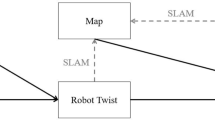Abstract
Robot localization is a fundamental capability of all mobile robots. Because of uncertainties in acting and sensing and environmental factors such as people flocking around robots there is always the risk that a robot loses its localization. Very often behaviors of robots rely on a valid position estimation. Thus, for dependability of robot systems it is of great interest for the system to know the state of its localization component. In this paper we present an approach that allows a robot to asses if the localization is still valid. The approach assumes that the underlying localization approach is based on a particle filter. We use deep learning to identify temporal patterns in the particles in the case of losing/lost localization in combination with weak classifiers from the particle set and perception for boosted learning of a localization monitor. The approach is evaluated in a simulated transport robot environment where a degraded localization is provoked by disturbances cased by dynamic obstacles.
Access this chapter
Tax calculation will be finalised at checkout
Purchases are for personal use only
Similar content being viewed by others
References
Carata, S.V., Neagoe, V.E.: A pulse-coupled neural network approach for image segmentation and its pattern recognition application. In: 2016 International Conference on Communications (COMM), pp. 61–64, June 2016
Dolezel, P., Skrabanek, P., Gago, L.: Pattern recognition neural network as a tool for pest birds detection. In: 2016 IEEE Symposium Series on Computational Intelligence (SSCI), pp. 1–6, December 2016
Eder, M.: Using particle filters and machine learning approaches for state estimation on robot localization scoring. Master’s thesis, Faculty for Computer Science and Biomedical Engineering, Graz University of Technology (2017)
Friedman, J., Hastie, T., Tibshirani, R.: Additive logistic regression: a statistical view of boosting. Ann. Stat. 38(2), 337–407 (2000)
Gerkey, B., Vaughan, R.T., Howard, A.: The player/stage project: tools for multi-robot and distributed sensor systems. In: Proceedings of the 11th International Conference on Advanced Robotics, pp. 317–323, June 2003
Hochreiter, S., Schmidhuber, J.: Long short-term memory. Neural Comput. 9(8), 1735–1780 (1997)
Sanguino, T.D.J.M., Gomez, F.P.: Toward simple strategy for optimal tracking and localization of robots with adaptive particle filtering. IEEE/ASME Trans. Mechatron. 21(6), 2793–2804 (2016)
Morales, N., Toledo, J., Acosta, L., Sánchez-Medina, J.: A combined voxel and particle filter-based approach for fast obstacle detection and tracking in automotive applications. IEEE Trans. Intell. Transp. Syst. 18(7), 1824–1834 (2017)
Polani, D.: Kullback-Leibler Divergence, pp. 1087–1088. Springer, New York (2013)
Quigley, M., et al.: ROS: an open-source robot operating system. In: ICRA Workshop on Open Source Software (2009)
Röwekämper, J., Sprunk, C., Tipaldi, G.D., Stachniss, C., Pfaff, P., Burgard, W.: On the position accuracy of mobile robot localization based on particle filters combined with scan matching. In: 2012 IEEE/RSJ International Conference on Intelligent Robots and Systems, pp. 3158–3164, October 2012
Schapire, R.E.: A brief introduction to boosting. In: Proceedings of the 16th International Joint Conference on Artificial Intelligence, IJCAI 1999, vol. 2, pp. 1401–1406. Morgan Kaufmann Publishers Inc., San Francisco (1999)
Schapire, R.E.: Explaining AdaBoost. In: Schölkopf, B., Luo, Z., Vovk, V. (eds.) Empirical Inference, pp. 37–52. Springer, Heidelberg (2013). https://doi.org/10.1007/978-3-642-41136-6_5
Shamov, I.A., Shelest, P.S.: Application of the convolutional neural network to design an algorithm for recognition of tower lighthouses. In: 2017 24th Saint Petersburg International Conference on Integrated Navigation Systems (ICINS), pp. 1–2, May 2017
Thrun, S., Burgard, W., Fox, D.: Probabilistic Robotics (Intelligent Robotics and Autonomous Agents). The MIT Press, Cambridge (2005)
Thrun, S., Fox, D., Burgard, W., Dellaert, F.: Robust Monte Carlo localization for mobile robots. Artif. Intell. 128(1), 99–141 (2001)
Author information
Authors and Affiliations
Corresponding author
Editor information
Editors and Affiliations
Rights and permissions
Copyright information
© 2019 Springer Nature Switzerland AG
About this paper
Cite this paper
Eder, M., Reip, M., Steinbauer, G. (2019). Using Particle Filter and Machine Learning for Accuracy Estimation of Robot Localization. In: Wotawa, F., Friedrich, G., Pill, I., Koitz-Hristov, R., Ali, M. (eds) Advances and Trends in Artificial Intelligence. From Theory to Practice. IEA/AIE 2019. Lecture Notes in Computer Science(), vol 11606. Springer, Cham. https://doi.org/10.1007/978-3-030-22999-3_60
Download citation
DOI: https://doi.org/10.1007/978-3-030-22999-3_60
Published:
Publisher Name: Springer, Cham
Print ISBN: 978-3-030-22998-6
Online ISBN: 978-3-030-22999-3
eBook Packages: Computer ScienceComputer Science (R0)




